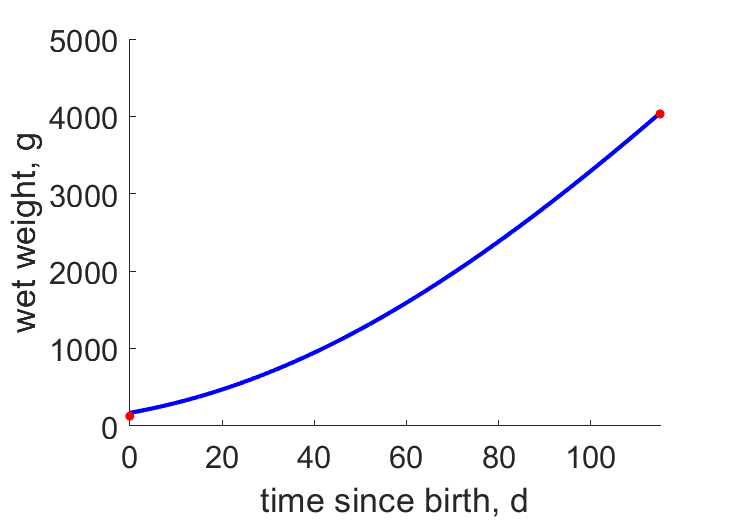Predictions & Data for this entry
| Model: std | climate: A | migrate: | phylum: |
| COMPLETE = 2.1 | ecozone: TN | food: biCvb, biCvm, biSvm | class: |
| MRE = 0.014 | habitat: 0iTf | gender: Dg | order: |
| SMSE = 0.001 | embryo: Tnpf | reprod: O | family: |
Zero-variate data
| Data | Observed | Predicted | (RE) | Unit | Description | Reference |
|---|---|---|---|---|---|---|
| ab | 56 | 55.44 | (0.00995) | d | age at birth | Rett1978 |
| tx | 145 | 144.8 | (0.001695) | d | time since birth at fledging | Rett1978 |
| tp | 435 | 451.9 | (0.03885) | d | time since birth at puberty | guess |
| tR | 1642 | 1642 | ( 0) | d | time since birth at 1st brood | Wiki |
| am | 6132 | 6191 | (0.00954) | d | life span | avibase |
| Ww0 | 143 | 151.9 | (0.06233) | g | initial wet weight | avibase |
| Wwb | 125 | 124.9 | (0.0009085) | g | wet weight at birth | guess |
| Wwi | 8300 | 8162 | (0.01662) | g | ultimate wet weight | avibase |
| Wwim | 4450 | 4458 | (0.001862) | g | ultimate wet weight for male | avibase |
| Ri | 0.00274 | 0.002746 | (0.002192) | #/d | maximum reprod rate | avibase |
Uni- and bivariate data
| Data | Figure | Independent variable | Dependent variable | (RE) | Reference |
|---|---|---|---|---|---|
| tW |  | time since birth | wet weight | (0.013) | Rett1978 |
Pseudo-data at Tref = 20°C
| Data | Generalised animal | Harpia harpyja | Unit | Description |
|---|---|---|---|---|
| v | 0.02 | 0.02257 | cm/d | energy conductance |
| p_M | 18 | 311.2 | J/d.cm^3 | vol-spec som maint |
| k_J | 0.002 | 0.0125 | 1/d | maturity maint rate coefficient |
| k | 0.3 | 0.2953 | - | maintenance ratio |
| kap | 0.8 | 0.9775 | - | allocation fraction to soma |
| kap_G | 0.8 | 0.7968 | - | growth efficiency |
| kap_R | 0.95 | 0.95 | - | reproduction efficiency |
Discussion
- Males are assumed to differ from females by {p_Am} only
- mod_1: Pseudo-data point k is used, rather than k_J; Data set tp and parameter t_R are added, the latter replacing clutch interval t_N. Postnatal T is based on PrinPres1991, see get_T_Aves. See further the revision page, theme puberty
Bibliography